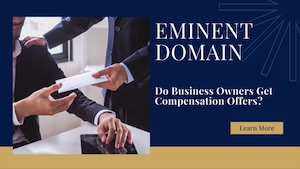
The purpose of this post is to address the process where a governmental entity makes an offer to purchase property in contemplation of the later use of the eminent domain.
This post will address the rule that applies for offers prior to eminent domain, known as “pre-condemnation offers,” address specifics applicable to business, and then contemplate some difficult questions.
Eminent Domain Compensation
Generally, the starting point for this discussion is statutory law. Government Code section 7267.2, subdivision (a)(1), establishes a process for determining the amount of “probable compensation” prior to adopting a resolution of necessity and initiating negotiations for the acquisition of “real property.”
Similarly, Government Code section 7267.1, subdivision (a), states that a “public entity shall make every reasonable effort to acquire expeditiously real property by negotiation.” (emphasis added.)
Similarly, Section 7267.1, subdivision (b), states that “real property shall be appraised before the initiation of negotiations…”
That is, the problem right off the top is that the relevant pre-condemnation offer statute does not address business owners. This is a serious oversight in the law.
This is particularly troubling because it is widely known that businesses have a right to “goodwill” value in eminent domain proceedings.
California Code of Civil Procedure section 1263.510 provides that the “owner of a business conducted on the property taken…shall be compensated for the loss of goodwill…” (emphasis added.)
Indeed, a business has a right to business goodwill even if the business is simply a “month-to-month” tenant without a written lease. (Los Angeles Unified School Dist. v. Pulgarin (2009) 175 Cal.App.4th 101.)
To that end, although the right to compensation in an eminent domain proceeding requires that the claimant show ownership of property taken by the agency taking the property through eminent domain (CCP § 1263.010(a)), whether a claimant’s right is compensable, does not depend on whether it can be called an “estate or interest in land.” (County of San Diego v. Miller (1975) 13 Cal.3d 684 [addressing an option to purchase land].)
Indeed, the statutory provisions governing the rules for compensation of particular interests in property specifically contemplate that they extend more generally to future and contingent interests and even to use restrictions. (CCP 6 1265.410(a)(1); City of Palm Springs v. Living Desert Reserve (1999) 70 Cal.App.4th 613.) This may become particularly important in the realm of leasehold bonus value.
Contemplated Eminent Domain
Nevertheless, the explicit recognition by both the legislature and the Courts of Appeal of the value of a business’s value demonstrates that business owners should receive compensation at the outset of any contemplated eminent domain action.
It is clear that they do not receive an offer of compensation because it does not appear to be contemplated by the statute. The bigger question is, isn’t it far past time that it be embedded there?
If you are faced with an eminent domain proceeding and would like assistance navigating the process, please contact the lawyers at Underwood Law Firm, P.C., for an initial consultation.
Go here to get more details.
 California Partition Law Blog
California Partition Law Blog

